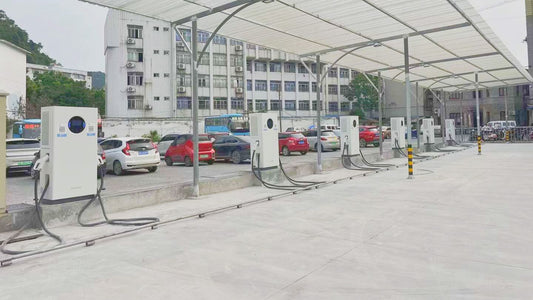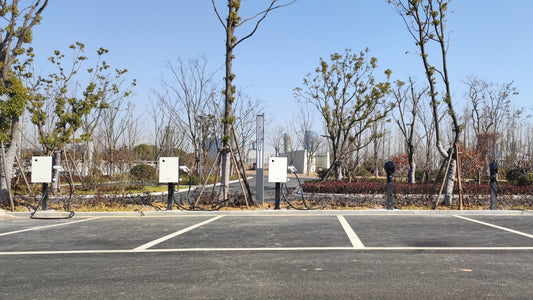Before installing an electric vehicle (EV) charger for your home, there are a few things you should consider:
Compatibility:
Make sure the charger is compatible with your EV model and the power supply in your home.
What type of charging station should I install?
The type of charging station you should install for your electric vehicle depends on your needs and preferences. Here are three types of charging stations you can consider:
Level 1: A level 1 charger plugs into a standard household outlet and is the slowest charging option. It provides up to 4-5 miles of range per hour of charging and is ideal if you drive short distances and have ample time for charging.
Level 2: A level 2 charger requires a 240-volt outlet and provides faster charging than a level 1 charger. It can provide up to 25 miles of range per hour of charging, making it ideal for daily charging needs.
DC fast charging: DC fast charging stations are the fastest charging option and are typically found at public charging stations or along major highways. It cost more and is not suitable and unnecessary for homeowners.
Consider your daily driving habits, charging needs, and budget when selecting a charging station for your home. It is recommended that you consult a licensed electrician to help you determine the best option for your home and needs.
Learn more about differences between AC chargers and DC chargers from here.
Charging speed:
Decide what charging speed you require based on your daily driving needs and the charging time you can afford.
Electrical capacity:
Check your home's electrical capacity and whether you need to upgrade it to support the EV charger.
Installation cost:
Get an estimate of the installation cost, including any necessary electrical work, and whether you can claim any rebates or incentives.
How much does it cost to install an electric vehicle charger?
The cost of installing an electric vehicle (EV) charger for your home can vary depending on several factors, including:
- The type of charger you choose (level 1, level 2, or DC fast charger).
- The electrical capacity of your home and whether any upgrades are needed.
- The distance from your electrical panel to the charger installation location.
- The cost of permits and fees required by your local authorities.
- The cost of labor and installation by an electrician or contractor.
Generally, the cost of a basic level 2 charging station, including installation, ranges from $500 to $1,500. However, if your home requires electrical upgrades or if you opt for a more expensive charging station, the cost can be higher. In some cases, you may be eligible for rebates, incentives, or tax credits that can help offset the cost of the installation. It is recommended that you get an estimate from a licensed electrician or installer to determine the exact cost of installation for your specific situation.
Can I install an EV charger myself, or do I need to hire a professional?
It is not recommended to install an electric vehicle (EV) charger yourself, as it can be dangerous and may not comply with local building codes and safety standards. The installation of an EV charger requires electrical expertise, and mistakes can result in damage to the charger, the vehicle, or your home's electrical system, and even put your safety at risk.
It is recommended that you hire a licensed electrician or a professional EV charger installer to ensure a safe and compliant installation. An electrician or installer can assess your home's electrical system, make necessary upgrades, and install the charger safely and correctly. They can also provide you with guidance on the right type of charger for your needs, obtain the necessary permits and comply with local codes, and provide warranty and maintenance services.
In addition, some local jurisdictions may require a permit or inspection for EV charger installations, which a licensed professional can assist with. Therefore, it is recommended that you consult with a licensed electrician or an EV charger installation professional to ensure a safe and proper installation of your EV charger.
Permits and codes:
Check local permits and codes for installing the EV charger and follow the safety guidelines.
Do I need to obtain any permits or approvals before installing an EV charger?
Yes, in most cases, you will need to obtain permits and approvals before installing an electric vehicle charger. The specific requirements can vary depending on your location and the type of charger you are installing. In many cases, you will need to obtain an electrical permit and have the installation inspected by a certified electrician or building inspector.
You may also need to obtain a permit from your local government or homeowners' association. It's important to research and follow all applicable regulations and guidelines to ensure a safe and legal installation.
Warranty and maintenance:
Ensure that the charger comes with a warranty and consider the maintenance requirements.
Electric vehicle chargers typically require minimal maintenance, but some general tasks that may need to be performed include:
Keeping the charging station clean and free of debris or obstructions.
Checking the cables and connections for any signs of damage or wear.
Inspecting the charger for any physical damage or defects.
Checking the software and firmware updates to ensure the charging station is up-to-date and working properly.
Replacing any faulty or damaged components or parts.
Scheduling periodic inspections or maintenance by a certified electrician or manufacturer's representative.
It's important to follow the manufacturer's guidelines for maintenance and service to ensure safe and reliable operation of the charging station.
Takeaways
Are these information clear enough to you?
Shop the most suitable EV chargers on www.wattsaving.com. Or you can contact us for more details and expert suggestions.




